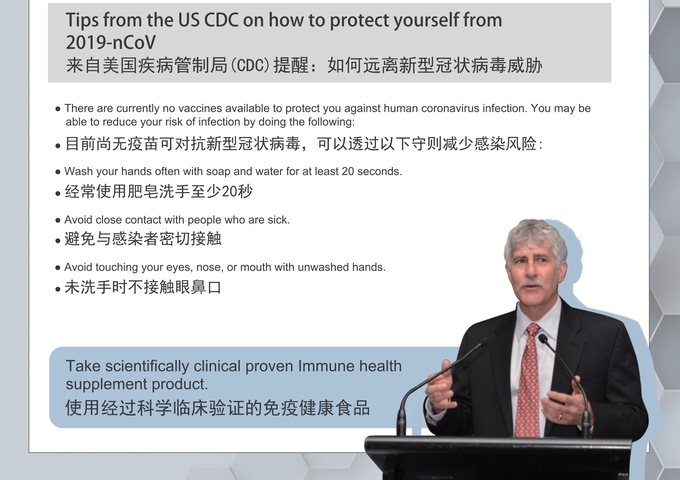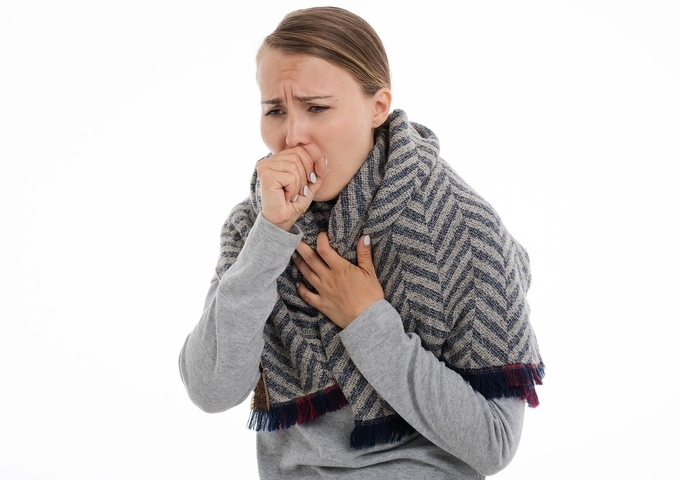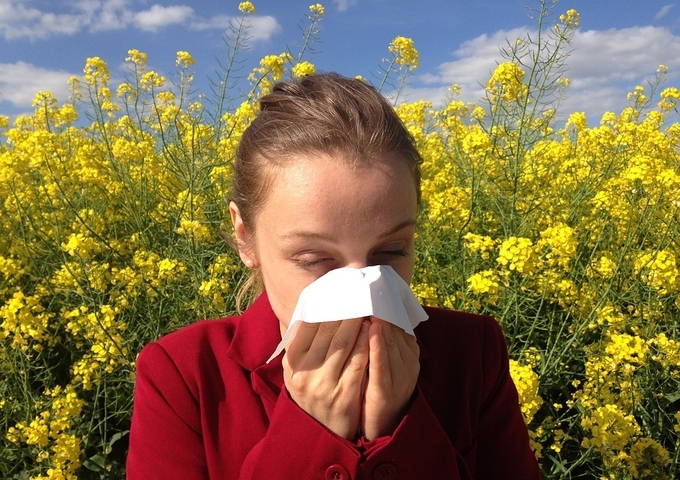2020, we wanted a new decade, not pandemic. Within just a few months’ time, COVID-19 has been spreading like wildfire globally, affecting at least 200 countries with an estimate of 1,420,000 cases reported with over 82,000 fatalities. The pandemic has only been getting worse without proper cure, causing endless fear and panic. The scary part about COVID-19 is that people who get infected can initially show no symptoms. With that, these people can unknowingly spread the virus through close contact with other people or respiratory droplets. The number of days for a person to show symptoms after getting infected ranges from 2-14 days. People who get infected typically show symptoms such as dry cough, fever and fatigue; if severe, pneumonia or acute respiratory distress syndrome can develop, some even had kidney and heart failure, which can lead to death. According to America’s immunology expert-Dr. Robert Stohrer, our immune system is the key to fighting COVID-19. At such critical period, our immune system is the best defense against infections. But as we age, our immunity eventually weaken, which increases risks in getting various diseases and infections. Studies have shown that those with severe to critical conditions are mostly older people, those with weak immunity or pre-existing health conditions. If you fit the above described, you need to strengthen your immunity more than anyone else! Our solution for you-Stolle ImmNuPlus is able to boost your immune function to a higher level, allowing your immune system to fight viral infection better. More than just ordinary milk, Stolle ImmNuPlus is a combination of natural milk nutrients and patented bioactive factors, which was scientifically proven to be effective in immune regulation, soothing inflammation and more, allowing those with weak or overactive immune system to achieve immune balance, which is the most ideal condition for battling the pandemic. Prevention is always better than cure. Together with Stolle, let’s fight our way out of this pandemic!
more


The below illustration is to help illustrate how immune function changes with age. What is normal immune balance is shown by the red line. As a baby, our immune systems start weak with immune balance building through childhood and the teenage years. As young adults, our immune health should be at it is peak. When we enter middle age, we begin to experience a decline in immune balance. This decline continues through the elderly stage. However, unhealthy lifestyles at all ages lead to a stressed and unbalanced immune system, leading to many disease states. Stolle has been focusing on balancing the immune system for over 60 years and this illustration illustrates why we need Stolle. Unbalanced Immune System Leads to Health Problems It is important to understand how an Unbalanced Immune System Leads to Health Problems. If it is Too Weak, the Immune system under-reacts and fails to attack dangerous targets: More infections such as Colds, Influenza Unhealthy GIT microflora and GIT disorders Also, Higher rates of cancers If it is Too Strong, The immune system over-reacts and attacks wrong targets: The immune system can attack normally “Safe” things such as pollen and certain foods resulting in Allergies. Normal cells/tissues can be attacked and damaged resulting in: Autoimmune disease such as Rheumatoid arthritis. The immune system can also overreact in many other situations resulting in: inflammation, pain, swelling and tissue damage. Therefore, It is critical to balance the immune system by directly stimulating our immune cells to support strong immune responses resulting in: Fewer infections, Healthier GIT and fewer cancers. We also need to Minimize over reactions of the immune system resulting in: Anti-inflammatory effects, Reduction of allergies and autoimmunity. There are so many way to have a balanced immune system, however, ImmunoNutrition is the most complete answer to balanced immunity and the key concept to remember.
more
There are no readily available cures for coronaviruses infections. The only cure known to science is the body’s own immune system.
more
Tips from the US CDC on how to protect yourself from 2019-nCoV
more
Antibiotics are ineffective against the H1N1 virus or any other virus for that matter. While antibiotics have no effect on the H1N1 virus itself, they may be useful to combat secondary bacterial infections which often follow viral infections. The only way to overcome infection by the H1N1 virus is to allow the immune system to eliminate the virus from the body. Because the immune system is the only defense against the H1N1 virus, it is of vital importance that the immune system be as fit as possible. Nutritional supplements such as those marketed by STOLLE can be important components of a balanced diet that provides support to the our own immune system. A healthy and fit immune system is much more likely to resist infection from any pathogen including the H1N1 virus than an immune system that does not have the appropriate support. STOLLE also contains a number of factors, which have been demonstrated to support immune system function. Immunoglobulins such as IgG, IgA and IgM are present in high concentrations in Stolle. These immunoglobulins are specific for a number of human pathogens. STOLLE provides a general immune support function that may provide enhanced protection against disease causing organisms including viruses such as the 2009 H1N1 Influenza A virus. In addition to consuming STOLLE, you can protect yourself with frequent hand washing, maintaining a healthy lifestyle, avoiding large crowds.
more
Allergens are everywhere and are ready to cause a variety of mild to severe diseases such as allergic rhinitis, atopic dermatitis, asthma…etc. What is an allergy and what are the properties of allergies? An allergy is a hypersensitivity disorder of the immune system. Allergic reactions occur when a person's immune system mistakenly reacts to and attacks normally harmless and often common substances encountered in the environment. These substances that cause allergies are called “allergens”. Allergic reactions are quite different from normal immune reactions because of the over-activation of populations of white blood cells called mast cells and basophils by a certain type of antibody called Immunoglobulin E (IgE). Allergies are known to be due to a malfunctioning (hypersensitive) immune system. Scientists believe allergies occur because people in the modern developed world live in cleaner environments and are exposed to fewer microorganisms because of changes in hygiene, diet and the use of antibiotics. As a consequence, people in the modern developed world also have far more allergies than people living in less sanitary conditions in the undeveloped world and those that lived in the past. Allergies are thought to first develop when we are young and our maturing immune systems become imbalanced due to under-stimulation by healthy normal flora, germs and other pathogens. Without the proper stimulation of the immune system by these microbes, the immune system does not develop or “learn” properly and as a result, overreacts to these normally harmless allergens thereby causing allergies. Over 30% of the world's population suffer from allergies! Allergies are among the most common afflictions in the world today with some form of allergies currently affecting 30-40% of the world population with the incidence projected to increase to over 50% in the next two decades! Allergic conditions are a major public health problem that is largely ignored by the medical community and the general public. One key reason for this apparent lack of concern is that allergies are often are not perceived as serious chronic diseases compared to higher profile diseases such as cancer or cardiovascular disease and as a result are often underdiagnosed and consequently remain untreated. Possibly the most alarming fact regarding allergies is that the incidence of allergies worldwide is increasing rapidly! What are the common allergic diseases and the allergens that cause them? Allergies are caused by normal substances (allergens) that we commonly encounter in our everyday environment. Allergens are found everywhere around us including the air we breathe, the liquids and solids we consume, things that come in contact with our skin and even from insect bites and stings. Common allergens include: plant pollen, animal dander, common foods like peanuts, mold and other fungi spores, insect saliva (mosquitos), insect venom (bees), medications, chemicals and even latex rubber gloves. These allergens cause a variety of mild to severe diseases. The most commonly diseases caused by allergens are: Allergic rhinitis, also known as hay fever is an inflammation of the nose and sinuses and is often caused by inhaled allergens such as pollen, fungi spores and animal dander. Asthma is a serious inflammatory disease of the lungs and can be caused by almost any allergen or irritant that can be inhaled. Atopic dermatitis is due to direct skin contact with allergens and other irritants. Food allergies are becoming increasingly common and can be caused by many commonly consumed foods such as peanuts, soy and eggs. Clinical symptoms of allergies. Allergic reactions result in inflammatory symptoms which can range from just simply annoying, to serious, to dangerous and even deadly. Allergic reactions can trigger irritation of the eyes, nasal passages/sinuses, lungs, throat, ears, the skin and also the gastrointestinal (GI) tract. Typical mild symptoms include itching of the nose, eyes and skin along with watery eyes and runny nose with sneezing. Sometimes the skin can become red, with swelling, dryness and even cracking. Generally, the symptoms of allergies can be quite unpleasant, but not life threatening. However, conditions such as asthma can be quite serious and may have a significant impact on one’s quality of life and one’s lifespan. In extreme cases, a life-threatening allergic reaction called anaphylaxis can occur which can result in dangerously low blood pressure, vomiting and inability to breath. If untreated, anaphylaxis can result in rapid death! How can allergies be prevented or cured? Perhaps the best way to prevent allergies is to avoid the allergens! If you know you have allergic rhinitis from seasonal pollen, simply try to avoid spending time outdoors during that time of the year. Sometimes you cannot avoid the allergens, making your next best option to use protection such as a face mask or face cloth to filter out much of the pollen. There are medical treatments such as desensitization and drugs that can help cure or relieve the symptoms of allergies. However, like all other drugs, anti-allergy drugs can have unpleasant side effects. If exposure to allergens is unavoidable, the best solution has been shown to balance your immune system and your microflora, thereby reducing allergies at the root cause versus just reliving the symptoms as drugs do.
more
Walking is a healthy exercise, but walking in various parts of the city when the air is full of harmful fine particulate matter is definitely not! Is PM2.5 bad for my health and if so, why? PM2.5 refers to atmospheric particulate matter (PM) that have a diameter of less than 2.5 micrometers. Yes, PM2.5 is very bad for our health! Short term exposure to PM2.5 has been shown to cause many health issues including eye, nose, throat and lung irritation, coughing, sneezing, runny nose and shortness of breath. Chronic exposure can lead to chronic bronchitis, reduced lung function and increased mortality from lung cancer and heart disease. In fact, the World Health Organization (WHO) classifies airborne particulates as a group one carcinogen. People with breathing and heart problems, children and the elderly may be particularly sensitive to exposure to PM2.5. PM2.5 can impede lung development in children and can leave them with reduced lung function for the rest of their lives. Illnesses caused by PM2.5 kill at least 3.1 million people a year across the world. The WHO estimates that exposure to PM2.5 reduces a person's life expectancy by an average of 8.6 months. The main reason PM2.5 is so dangerous is due to the small particle size. Airborne particles larger than 2.5 micrometers are also bad for our health, but these larger particles do not penetrate deeply into the lungs and are “washed” out of the lungs by the constant outward flow of mucus and then by coughing and swallowing. On the other hand, PM2.5 particles are so small that they can penetrate deep into the lungs where they are not “washed” out and can continue to accumulate over one’s lifetime. In fact, the smallest of the PM 2.5 particles can actually penetrate into the bloodstream and travel to all the other organs causing immune system damage, disease and even increasing your cancer risks by up to 36%. What is the best way to protect myself from PM2.5? When you know levels of PM2.5 are high, you can take these precautions: Stay indoors in an area with filtered air if possible. Use whole house HEPA filters or room air purifiers that use either HEPA filters or electrostatic elements. Avoid strenuous activity that causes heavier and deeper breathing. Wear a properly certified respirator. Many inexpensive disposable masks will only filter out large particulates and will allow the passage of PM2.5 into the lungs. Look for respirators rated as N-95 or P-100 and be sure you have the mask fitted properly. Cloth masks such as scarves are of no help. Unfortunately, the only way to reduce PM2.5 levels is to stop it at the source - cars, factories, waste burning, fossil-fueled power plants. Until then, stay indoors or strap on the respirators. Is there anything else I can do to protect myself? Since exposure to PM2.5 has been shown to cause cardiovascular disease, to be immune suppressive, proinflammatory and cancer inducing, a healthy immune system is one of your best defenses against these disorders caused by PM2.5. Many studies have shown that Stolle modulates the immune system in a positive way which can reduce immune suppression, inflammation, cancer and cardiovascular disease risk factors leading to a lifetime of better health!
more
Enteroviruses are everywhere and are ready to infect us with mild diseases such as the common cold and HFMD or much more serious diseases that can permanently damage the nervous system and the cardiovascular system. What is an enterovirus? Enteroviruses are a large group of very common viruses that cause a variety of diseases, some of which cause serious and illness while some cause little or no illness. Probably the most famous enteroviruses are the polioviruses which cause poliomyelitis and the rhinoviruses which often cause the common cold. Over 100 different enteroviruses have been found to infect humans. For the purpose of this story, we will focus on the human enterovirus 71 that have been common in Asia and often causing serious illness (illnesses such as hand, foot, and mouth disease ; HFMD) over the last few years. When are enterovirus (HFMD) epidemics most likely to occur? In Asia, we can experience epidemics of enterovirus infections at almost any time of the year. However, the majority of enteroviruses cases occur from May through September of each year but exact timing can be quite variable. The severity of the outbreaks each season also can vary and often depends on the particular strain of enteroviruses that is most prevalent in the population along with many other variables. Unfortunately, there is no predictable pattern for when enteroviruses will cause infections, illnesses and epidemics. Wash your hands often to help prevent an enterovirus outbreak. How does HFMD spread among humans? Enteroviruses can be transmitted from infected individuals to healthy individuals in a variety of different ways depending on the enteroviruses strain and exact symptoms caused by the infection. Infected individuals can shed enteroviruses in the secretions from eyes, nose and mouth, in feces and in fluid from skin blisters. A healthy individual can be infected by having close contact with an infected person or objects that have been in contact with or near an infected person. Being exposed to sneezes, coughs, shaking hands along with touching contaminated doorknobs and light switches can result in infection by enteroviruses. Changing the diapers of an infected infant or even drinking contaminated water can all result in transmission of enteroviruses to healthy individuals. What are the clinical symptoms of enterovirus infections? Fortunately, the majority of individuals who become infected with enteroviruses do not become ill or they suffer only mild illness. Symptoms of these mild illnesses caused by enteroviruses include: fever, runny nose, sneezing, cough, skin rashes, blisters in and around the mouth and on hands along with muscle and body aches. These symptoms, typically go away on their own in a few weeks. However, it should be noted that people who are infected but showing no symptoms or only mild symptoms still shed infectious virus particles that will easily infect others. Unfortunately, some enteroviruses infections result in very serious symptoms and complications such as conjunctivitis (eyes), meningitis and encephalitis (spinal cord and brain), myocarditis and pericarditis (heart), acute paralysis and progressive muscle weakness. Individuals with severe infections that affect the heart and brain can have permanent damage and may never recover. In extreme cases, death can even occur! How do we prevent and cure enterovirus (HFMD)? At this time there is no known cure for enteroviruses infections. Unlike bacteria, enteroviruses and all other viruses are not susceptible to antibiotics. The only treatment options are supportive care such as rest and analgesics for pain and fever. Most infected individuals usually recover completely on their own. However, some enterovirus infections can be severe enough to require hospitalization and even critical care. Prevention is the best way to fight enteroviruses infections. There are vaccines that are effective against certain enteroviruses such as the polioviruses. However, because there are so many different non-polio enteroviruses along with the fact that they can mutate rapidly, medical science has not yet been able to develop widely available vaccines against the vast majority of non-polio enteroviruses. Currently, the best ways to prevent enterovirus infections and disease are to avoid contact with the viruses and to maintain a strong immune system. Ways to avoid contact with the viruses includes staying away from infected individuals, wearing face masks, practicing good hand washing technique and disinfecting items that have come in contact with infected individuals. In addition to avoiding contact with enterovirus, International Journal of Medical Research reports that the activity of lactoferrin helps prevent enterovirus 71 infection (HFMD). A balanced immune system not only helps you prevent being infected but will also allow you to recover more quickly with fewer or even no symptoms. The best ways to develop and maintain a strong immune system are to have a healthy lifestyle by: eating a healthy diet, exercising regularly, maintaining a healthy weight and getting enough sleep.
more







